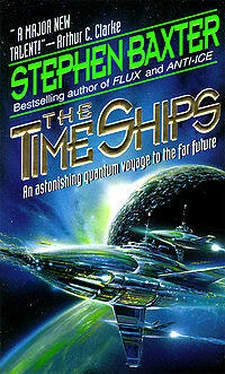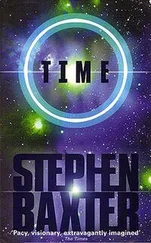1 ...6 7 8 10 11 12 ...119 I raised my lamp, but its glow carried only a few feet. All was silent — there was not a breath of wind, not a trickle of water; and I wondered if the Thames still flowed.
For lack of a definite destination, I decided to make towards the site of the great food hall which I remembered from Weena’s day. This lay a little distance to the north-west, further along the hill-side past the White Sphinx, and so this was the path I followed once more — reflecting in Space, if not in Time, my first walk in Weena’s world.
When last I made this little journey, I remembered, there had been grass under my feet — untended and uncropped, but growing neat and short and free of weeds. Now, soft, gritty sand pulled at my boots as I tramped across the hill.
My vision was becoming quite adapted to this night of patchy star-light, but, though there were buildings hereabout, silhouetted against the sky, I saw no sign of my hall. I remembered it quite distinctly: it had been a gray edifice, dilapidated and vast, of fretted stone, with a carved, ornate doorway; and as I had walked through its carved arch, the little Eloi, delicate and pretty, had fluttered about me with their pale limbs and soft robes.
Before long I had walked so far that I knew I must have passed the site of the hall. Evidently — unlike the Sphinx and the Morlocks — the food palace had not survived in this History — or perhaps had never been built, I thought with a shiver; perhaps I had walked — slept, even taken a meal! — in a building without existence.
The path took me to a well, a feature which I remembered from my first jaunt. Just as I recalled, the structure was rimmed with bronze and protected from the weather by a small, oddly delicate cupola. There was some vegetation — jet-black in the star-light — clustered around the cupola. I studied all this with some dread, for these great shafts had been the means by which the Morlocks ascended from their hellish caverns to the sunny world of the Eloi.
The mouth of the well was silent. That struck me as odd, for I remembered hearing from those other wells the thud-thud-thud of the Morlocks’ great engines, deep in their subterranean caverns.
I sat down by the side of the well. The vegetation I had observed appeared to be a kind of lichen; it was soft and dry to the touch, though I did not probe it further, nor attempt to determine its structure. I lifted up the lamp, meaning to hold it over the rim and to see if there might be returned the reflection of water; but the flame flickered, as if in some strong draught, and, in a brief panic at the thought of darkness, I snatched the lamp back.
I ducked my head under the cupola and leaned over the well’s rim, and was greeted by a blast of warm, moist air into the face — it was like opening the door to a Turkish bath — quite unexpected in that hot but arid night of the future. I had an impression of great depth, and at the remote base of the well I fancied my dark-adapted eyes made out a red glow. Despite its appearance, this really was quite unlike the wells of the first Morlocks. There was no sign of the protruding metal hooks in the side, intended to support climbers, and I still detected no evidence of the machinery noises I had heard before; and I had the odd, unverifiable impression that this well was far deeper than those other Morlocks’ cavern-drilling.
On a whim, I raised my Kodak and dug out the flash lamp. I filled up the trough of the lamp with blitzlichtpulver, lifted the camera and flooded the well with magnesium light. Its reflections dazzled me, and it was a glow so brilliant that it might not have been seen on earth since the covering of the sun, a hundred thousand years or more earlier. That should have scared away the Morlocks if nothing else! — and I began to concoct protective schemes whereby I could connect the flash to the unattended Time Machine, so that the powder would go off if ever the machine was touched.
I stood up and spent some minutes loading the flash lamp and snapping at random across the hill-side around the well. Soon a dense cloud of acrid white smoke from the powder was gathering about me. Perhaps I would be lucky, I reflected, and would capture for the wonderment of Humanity the rump of a fleeing, terrified Morlock!
…There was a scratching, soft and insistent, from a little way around the well rim, not three feet from where I stood.
With a cry, I fumbled at my belt for my poker. Had the Morlocks fallen on me, while I daydreamed?
Poker in hand, I stepped forward with care. The rasping noises were coming from the bed of lichen, I realized; there was some form, moving steady through those tiny, dark plants. There was no Morlock here, so I lowered my club, and bent over the lichen bed. I saw a small, crab-like creature, no wider than my hand; the scratching I heard was the rasp of its single, outsize claw against the lichen. The crab’s case seemed to me to be jet black, and the creature was quite without eyes, like some blind creature of the ocean depths.
So, I reflected as I watched this little drama, the struggle to survive went on, even in this benighted darkness. It struck me that I had seen no signs of life — save for the glimpses of Morlock — away from this well, in all my visit here. I am no biologist, but it seemed clear that the presence of this fount of warm, moist air would be bound to attract life, here on a world turned to desert, just as it had attracted this blind farmer-crab and his crop of lichen. I speculated that the warmth must come from the compressed interior of the earth, whose volcanic heat, evident in our own day, would not have cooled significantly in the intervening six hundred thousand years. And perhaps the moisture came from aquifers, still extant below the ground.
It may be, I mused, the surface of the planet was studded with such wells and cupolas. But their purpose was not to admit access to the interior world of the Morlocks — as in that other History but to release the earth’s intrinsic resources to warm and moisten this planet deprived of its sun; and such life as had survived the monstrous engineering I had witnessed now clustered around these founts of warmth and moisture.
My confidence was increasing — making sense of things is a powerful tonic for my courage, and after that false alarm with the crab, I had no sense of threat — and I sat again on the lip of the well. I had my pipe and some of my tobacco in my pocket, and I packed the bowl full and lit up. I began to speculate on how this History might have diverged from the first I had witnessed. Evidently there had been some parallels — there had been Morlocks and Eloi here — but their grisly duality had been resolved, in ages past.
I wondered why should such a show-down between the races occur — for the Morlocks, in their foul way, were as dependent on the Eloi as were Eloi on Morlock, and the whole arrangement had a sort of stability.
I saw a way it might have come about. The Morlocks were of debased human stock, after all, and it is not in man’s heart to be logical about things. The Morlock must have known that he depended on the Eloi for his very existence; he must have pitied and scorned him — his remote cousin, yet reduced to the status of cattle. And yet -
And yet, what a glorious morning made up the brief life of the Eloi! The little people laughed and sang and loved across the surface of the world made into a garden, while your Morlock must toil in the stinking depths of the earth to provide the Eloi with the fabric of their luxurious lives. Granted the Morlock was conditioned for his place in creation, and would no doubt turn in disgust from the Eloi’s sunlight and clear water and fruit, even were it offered to him but still, might he not, in his dim and cunning fashion, have envied the Eloi their leisure?
Читать дальше
Конец ознакомительного отрывка
Купить книгу









